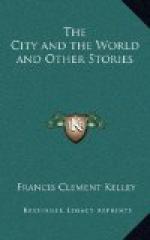“But you did not tell me it would cost more,” urged the priest.
“No, sur; no, sur; I didn’t, sur; but a child would know that. Now look here at the plans.”
“Just a minute, Mr. McMurray,” broke in the architect, suavely. “Let me explain. You see, Father, I was your representative both as architect and superintendent of the building. I know that McMurray’s bill of extras is right. I passed on them and everything he did was necessary. There are extras, you know, on every building.”
“But,” said the priest, “I told you I had only eight thousand dollars, and that the furnishings would take all over the amount called for by the contract. You can not expect to get blood out of a stone. Here now you say I must pay a thousand dollars more; but where can I get the money?”
“Well, Father,” said the architect, “I don’t think you will have to worry much about that. You priests always manage somehow, and you got off cheap enough. That church is worth ten thousand dollars, if it’s worth a cent; and McMurray did you a clean, nice job. Now one thousand dollars won’t hurt you; the Bishop will be reasonable and you will get the money in a year or so.”
“It looks as if I had to get it, somehow. I don’t see how I can do anything else,” answered the priest. “This thing has sort of stunned me. Give me one month and let me do my best. I wish I had never started that building at all.”
“Yes, sur; yes, sur,” said McMurray quickly. “You can have a month, sur. I am not a hard man, sur; but I’ve got to pay off me workers, you know. But take the month, sur, take it—take it.”
McMurray looked longingly at the door.
All three had arisen; but the priest’s step had lost its spring as he escorted his visitors out.
Both of them were silent for the distance of a block away from the Rectory, and then McMurray said:
“Yes, sur; yes, sur; I feel like ——.”
“I do too,” broke in the architect. “I know what you were going to say. He took it pretty hard.”
Not another word was spoken by either of them until the hotel was reached, and they had drowned the recollection of the young face, with the look of age upon it, in four drinks at the bar.
When the priest, with a slight look of relief, closed the door upon his visitors and bolted it after them, he had perhaps seen a little humor in the situation; but the bolting of the door was the only sign of it. His face was still grave when he stood, silent and stunned, staring at the bill on the table.
“The good Lord help me,” he prayed. “One thousand dollars and the Bishop coming in two weeks! What can I say to him? What can I do?”
He pulled out a well thumbed letter from his pocket and read it to himself, though he knew every word by heart.




